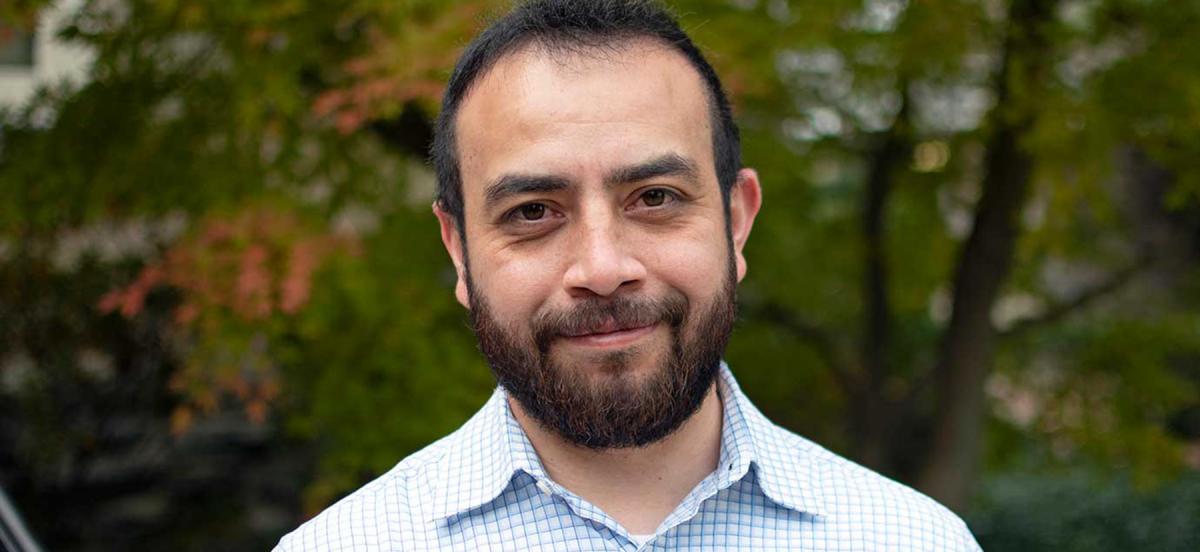Haverford Welcomes M. Antonio López Galicia as Friend in Residence

Exective Director of Casa de los Amigos in Mexico City M. Antonio López Galicia is this semester's Friend in Residence. Photo by Olivia Wong '21.
Details
The executive director of Casa de los Amigos in Mexico City, López joins us on campus for a week of talks, classroom visits, and more related to his work in human rights, peace education, and the protection of those most vulnerable.
For the past nine years, Haverford College's Friend in Residence program has brought experienced Quakers to campus for extended interactions with staff, faculty, and the community. These twice yearly visitors enrich the educational experience for Haverford students by serving as classroom resources and strengthen the College's connection to its Quaker roots and the broader Quaker community by offering public programs, such as talks and performances.
"Quakerism is a faith grounded in the direct experience of the inner spiritual life and in engagement with the community and the wider world," says Walter Sullivan, director of Quaker Affairs. "It cannot really be known through the study of texts alone or in the intellectual engagement with theory or doctrine. To best understand what Quakerism is and, thereby, to understand how 'Quaker values' impact our shared community here on campus, I believe that members of the community… need to interact with real people, living real lives, and trying, for better or worse, to follow the Quaker Way."
This week, the that person is M. Antonio López Galicia, executive director of Casa de los Amigos and this semester's Friend in Residence. "La Casa," a Quaker hospitality center that works building peace and international understanding in the heart of Mexico City, has been a longtime partner of the College's Center for Peace and Global Citizenship (CPGC), annually hosting summer interns and students on field migration studies since 2007. During his residency, López will meet with students interested in that internship, give two public talks, and visit several classes across a spectrum of disciplines (health studies, history, Spanish, and more).
"Toño will be the first Quaker who is not from the United States or Canada to serve as our Friend in Residence," says Sullivan. "I am very excited for members of the Haverford community to hear about the diversity of Quaker experience around the globe, and I hope that Toño's work with migrant and refugee communities and the particularly Quaker ways that this work is organized will be of significant interest to the community."
López grew up in La Casa's home base of Mexico City and trained as a psychologist and lawyer, eventually becoming a professor of thanatology—the study of death and the practices associated with it—at the Mexican Institute of Psycho-oncology, where he researches and publishes on the human rights of children, migrants, and refugees. After four years on its Board, López took over the reins of La Casa in 2016—its 60th anniversary year—and his path to membership in the Society of Friends runs through his work there.
"As director of La Casa I [began] a learning experience in Quaker spirituality," says the convinced Quaker. "I felt the call of the spirit, and today I consider Quakerism a path of spirituality that helps to improve the world and human relations."
López's events on campus include two public talks on Friday, Oct. 26. At the first, "Death, Dying, Spiritual Health, and Migrant Communities in Mexico," he will share the spiritual, humanistic framework he's created from the thanatology work he's done with migrants and refugees. And at the second, "Radical Hospitality Across Culture: Migration, the Border, and the Casa de los Amigos in Mexico City," he will discuss his work at La Casa and how conditions on the Mexican/U.S. border impact that work.
"Quakerism is a religion of peace and an ideology of peace," says López. "It has helped me to be better human [and] has been a call in my life to service and spiritual action."
"I hope many members of the community get to meet Toño, to experience his gentle, faithful commitment to the work for justice and healing in a violent and unjust world," says Sullivan. "I hope some will ask themselves, 'What is my gift to offer in this shared work of healing the world? What are the implications for me in the example that Toño offers?'"



